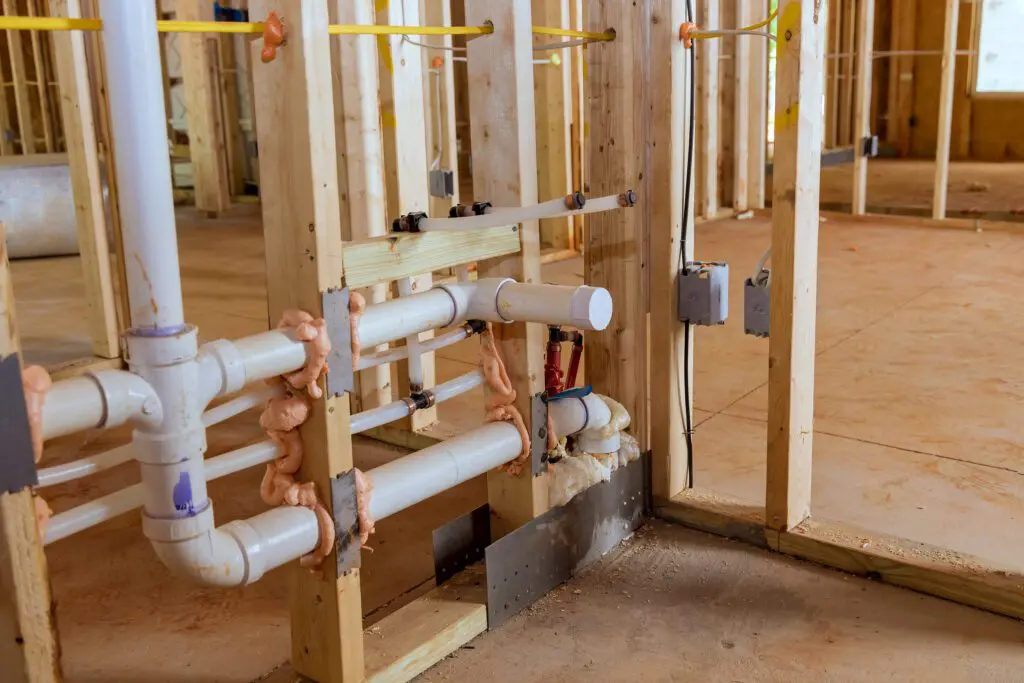“Although this article highlights plumbing choices for central Alabama and the Southeastern U.S., the insights and tips provided are valuable for homeowners in various states. Discover the right plumbing materials for your needs, no matter where you call home.”
In the world of plumbing, plastic pipes have emerged as a popular alternative to traditional metal pipes due to their affordability, lightweight nature, and corrosion-resistant properties, making them particularly suitable for the southeastern U.S. climate. With advantages like effectively maintaining hot water temperatures and preventing condensation buildup from cold water, plastic pipes offer practical benefits that have led both homeowners and plumbers to favor them.
When it comes to plastic pipes, two prominent options are ABS (acrylonitrile butadiene styrene) and PVC (polyvinyl chloride). These materials each have distinct characteristics, and the choice between them depends on factors such as local building codes in your area, project requirements, and personal preferences. Checking your local building codes is crucial, as certain regulations might mandate the use of one type over the other.
Overview of Plumbing With ABS Pipe
ABS pipes, typically black in color, find common usage in drainage, sewage, and ventilation systems in Alabama’s diverse climate. Particularly in drain-waste-vent (DWV) setups, ABS demonstrates its durability in withstanding varying temperatures, ensuring resistance against both chemical and physical stresses. This resilience makes it ideal for applications ranging from industrial environments like factories to laboratory settings. However, it’s important to note that ABS contains BPA (bisphenol A), a plastic hardening agent that could potentially leach into water. While there have been concerns about the health implications of BPA, current levels present in foods have been deemed safe by the Food and Drug Administration.
Overview of Plumbing With PVC Pipe
PVC pipes, on the other hand, are recognized for their white or light-colored appearance and widespread use in plumbing and drainage systems throughout the southeastern U.S. Like ABS, they are employed in DWV and sewerage setups, offering durability and resistance to Alabama’s specific physical and chemical stressors. Furthermore, PVC’s flexibility surpasses that of ABS, translating to enhanced resistance against cracking or breaking under various pressures. This flexibility, along with the softness of the PVC material, enables it to withstand higher temperatures often experienced in most humid areas without deformation.
Comparing ABS and PVC
In the realm of standard household applications, it’s essential for Southeastern residents to understand the differences between ABS and PVC pipes. While both share commonalities in plumbing uses and physical characteristics, their distinctions, particularly in cost and installation methods, hold significant implications. ABS pipes shine with their straightforward one-step connection process, ensuring a swift and efficient solution for plumbing projects. In contrast, PVC pipes require a more labor-intensive two-step connection procedure, involving the application of a purple primer before cement application, which can drive up costs. Intriguingly, despite being slightly pricier than PVC pipes, ABS might emerge as the more cost-effective choice in Alabama, primarily due to its streamlined installation process. However, it’s crucial to note that this article primarily pertains to standard household applications and does not apply to specialized scenarios like water heater replacement.
Advantages of PVC Pipes and Five Reasons to Choose Them:
- Chemical Resistance: PVC pipes are highly resistant to a wide range of chemicals, making them suitable for industrial applications and environments with varying chemical exposure.
- Temperature Stability: PVC pipes maintain their structural integrity even under high temperatures, making them ideal for hot water transport without compromising performance.
- Flexibility: PVC pipes are more flexible than ABS, reducing the risk of cracks and breaks under pressure and enhancing their reliability over time.
- Variety of Sizes and Fittings: PVC pipes come in a wide range of sizes and fittings, allowing for customization to suit various plumbing configurations and needs.
- Sound Absorption: PVC pipes are effective at muffling the sound of running water, contributing to a quieter plumbing system and a more comfortable living environment.
Drawbacks of ABS Pipes and Five Considerations to Keep in Mind:
- Limited Impact Resistance: PVC pipes may have reduced impact resistance compared to some other materials, potentially making them more vulnerable to physical damage.
- Brittleness in Cold Temperatures: While PVC pipes excel in high-temperature environments, they can become more brittle in extreme cold temperatures, potentially leading to cracks or breaks.
- Adverse Environmental Impact: PVC production involves the use of chlorine, which can release harmful byproducts into the environment. The disposal of PVC pipes at the end of their life cycle can also raise environmental concerns.
- Potential Health Concerns: Although PVC pipes are generally considered safe for carrying water, there have been concerns about the leaching of chemicals into the water supply over time. This may raise health concerns, particularly in cases of long-term exposure.
- Fittings and Installation Complexity: While PVC pipes offer a variety of sizes and fittings, their two-step connection process, involving the use of a purple primer and cement, can add complexity to the installation process and may require additional labor and time.
Advantages of ABS Pipes and Five Reasons to Choose Them:
- Durability: ABS pipes are highly durable and can withstand varying temperatures, making them suitable for both hot and cold water applications.
- DWV Applications: ABS pipes are commonly used in drain-waste-vent systems, efficiently removing wastewater from buildings and maintaining sanitation.
- Industrial Compatibility: Due to its resistance to chemicals, ABS is well-suited for industrial environments such as factories and laboratories where chemical exposure is common.
- Shock Resistance: ABS pipes are stronger and more shock-resistant than some other materials, making them suitable for areas prone to impacts or potential damage.
- Quick Installation: ABS pipes offer a one-step connecting process, simplifying installation with instant bonding using specialized cement, which can save time during plumbing projects.
Drawbacks of ABS Pipes and Five Considerations to Keep in Mind:
- Limited Chemical Resistance: While ABS pipes are resistant to some chemicals, they may not be as versatile as PVC pipes in withstanding a wide range of chemical exposures. This limits their suitability for certain industrial applications.
- Lower Temperature Tolerance: ABS pipes may not perform as well as PVC pipes in extremely high-temperature environments. They could be susceptible to warping or deformation under prolonged exposure to heat.
- Less Flexibility: ABS pipes are generally less flexible than PVC pipes, which may make them more prone to cracking or breaking under pressure, particularly in situations with frequent temperature fluctuations.
- Noise Transmission: Unlike PVC pipes, ABS pipes may not be as effective at muffling the sound of running water, potentially resulting in a noisier plumbing system.
- Environmental Concerns: ABS is not as environmentally friendly as some other piping materials due to its production processes and potential for releasing harmful substances into the environment over time.
Conclusion
For Southeastern residents, choosing between ABS and PVC pipes can be crucial, especially when considering factors like cost and installation methods. ABS pipes, preferred by some plumber Birmingham AL experts, offer the advantage of a straightforward one-step connection process, instantly bonding with special cement, simplifying plumbing projects. In contrast, PVC pipes require a two-step connection process, including the application of a purple primer before cement application, potentially increasing labor costs for Alabama residents. Surprisingly, even though ABS pipes are slightly pricier than PVC pipes, their efficiency in the streamlined installation process can make them a more cost-effective choice in Alabama.




